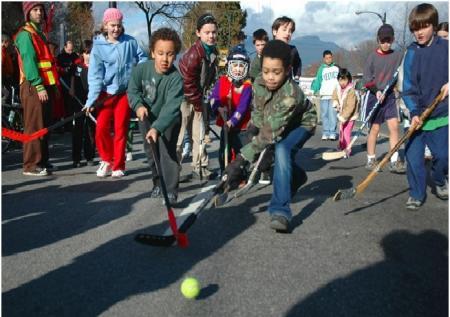
More than 500 communities in Britain have already signed up to the ‘Playing Out’ initiative, which works with local councils to temporarily pedestrianize roads for an hour or two each week to allow children to play safely near their homes, according to telegraph.co.uk.
A new analysis of the simple scheme by the University of Bristol found that residents reported a greater sense of a community, overall happiness, and said their areas were more friendly and safer. One woman claimed the project had even helped her combat post-natal depression.
Children’s activity levels also soared by between three and five-fold on the road closure days, and parents said skills such as cycling and road safety awareness had also improved.
As more children started to get to know each other, the study authors found that a ‘calling for you’ culture developed where youngsters began drop in on each other to see if their new friends wanted to play outdoors.
Youngsters interviewed said that were it not for the scheme they would usually be sitting inside, watching TV, playing video games, or eating pizza.
“This resident-led intervention shows the potential for meaningful increases in physical activity as well as social benefits to both children and the communities in which they live.
“It is relatively low cost, scaleable and potentially sustainable — this is why it makes sense for public health.”
Although NHS guidelines suggest that, from the age of five, children need 60 minutes of physical activity a day only 21 percent of boys and 16 percent of girls achieve that.
Each extra hour of activity daily is associated with 0.5 lower Body Mass Index, but declining exercise levels means that one in three youngsters in Britain is now overweight or obese.
The Playing Out movement was founded in 2011 by Alice Ferguson, a mother who wanted her own children to be able to play in the street, as she had done as a child.
The Bristol study found children using the scheme were outdoors for at least 70 per cent of the time that the roads were closed.
Ferguson said: “We never expected it to take off like this and to have so many amazing outcomes for whole street communities.
“This growing movement is really starting to challenge the idea that ‘playing out’ is a thing of the past.
“Children today need the chance to be outside, active, making friends and being part of their communities just as much as we did a generation ago.”
